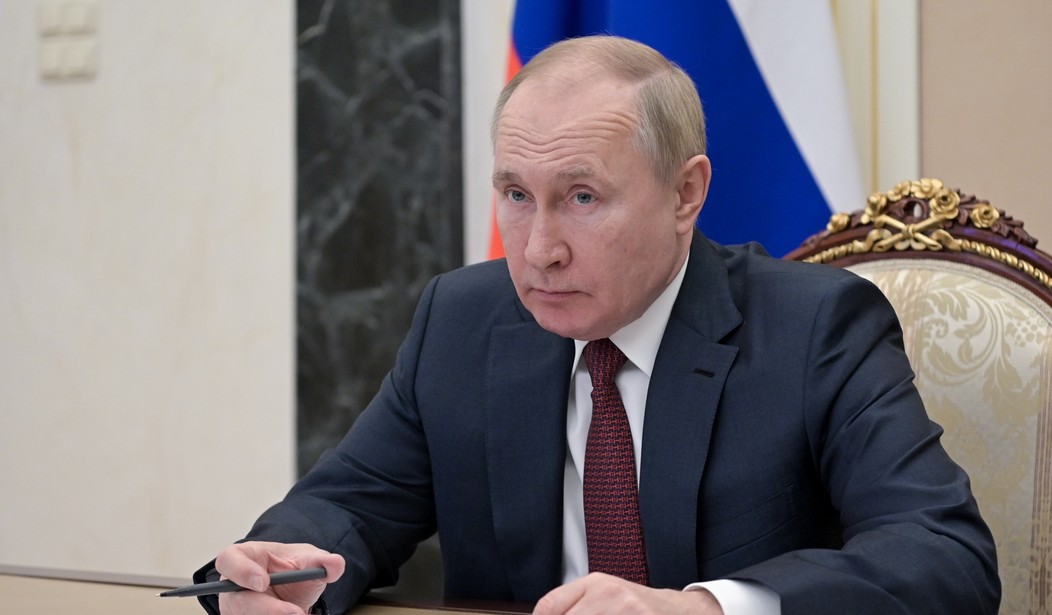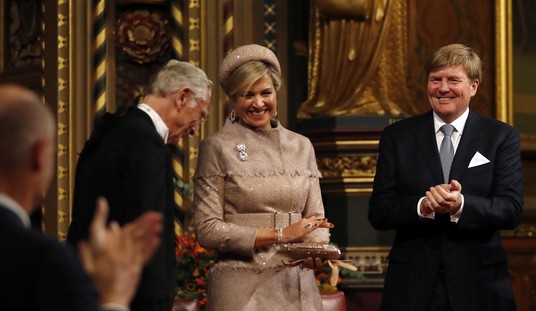There are two ways one might explain Putin’s war so far. One: He’s been playing eight-dimensional chess all along, opting to invade Ukraine on five different fronts and take heavy losses as a sort of “feint,” part of a masterful distraction strategy aimed at securing control of only the Donbas in the east.
Two: His deputies lied to him about the Russian military’s capabilities.
Which theory does Occam’s Razor tell us is likely correct?
NEW: "We believe that Putin is being misinformed by his advisors about how badly the Russian military is performing and how the Russian economy is being crippled by sanctions," a US official tells me, "because his senior advisors are too afraid to tell him the truth.”
— Peter Alexander (@PeterAlexander) March 30, 2022
NEW: “We have information that Putin felt misled by the Russian military,” the U.S. official tells me. “There is now persistent tension between Putin and the MOD (Ministry of Defense), stemming from Putin’s mistrust in MOD leadership.”
— Peter Alexander (@PeterAlexander) March 30, 2022
Putin feeling misled about the strength of his army would explain why a Russian general was recently sacked and may explain why Shoigu and Gerasimov, the defense minister and chief of staff, respectively, haven’t been seen much lately. It would also jibe with reports of Russian amateurism on the battlefield, from poor tactics in protecting their armor to the sometimes pitiful state of their equipment.
Russian troops in Ukraine have scrambled to avoid detection and attack by using tree branches and straw, even swaths of carpeting, to conceal tanks and other armored vehicles, in what analysts call a surprising lack of sophistication for such an advanced military and further evidence of how ill-prepared some commanders were for the sustained fight that has unfolded…
In one, purportedly captured mid-firefight by a Russian soldier seeking cover amid a cluster of idling armored transports, a patchwork of what appear to be pine saplings is visible along one of the vehicle’s flanks. It’s a sight that “smacks of desperation,” said Mike Jason, a retired U.S. Army armor officer who served in Iraq and Afghanistan…
To the bewilderment of many Western observers, Russian soldiers have shown a tendency to speak on unsecured radios and cellphones, allowing enemy intelligence to intercept their communications. Military planners also have failed to distribute enough fuel and food, prompting troops to abandon vehicles in place and, in some cases, surrender.
“The Russians really f***ed this up,” said one U.S. official to Politico of Moscow’s campaign. They f***ed it up so much, in fact, that lately the Pentagon seems torn between gloating over America’s military advantage and wondering “how they could have so badly misjudged the strength of the Russian military.”
And yet, as the war approaches its sixth week, there remain a few determined proponents of the first theory, that Putin, like Pee Wee Herman, meant to do this.
The idea, I guess, is that Russia had to attack Kiev, Chernihiv, and Kharkiv in the north to force Ukrainian forces based there to stay put and defend them while the “real” Russian advance on the Donbas took place in the east. There was never any real intent to occupy those northern cities, just as there was never any real intent behind Putin’s blather about “denazification” and demilitarization in his rambling speech announcing the war. “Ukraine has never had its own authentic statehood. There has never been a sustainable statehood in Ukraine,” he said at one point in that speech before warning that Kiev, with the west’s help, could develop nuclear weapons that threaten Russia.
Does that sound like a casus belli focused exclusively on the disputed territories in the east?
For cripes sake, even Russia’s own state propaganda is fretting about what it would mean for the country’s great-power status if they’re forced to make a peace deal with a nation as small as Ukraine.
And yet, there are some who embrace the “Pee Wee” theory of the campaign, that whatever the war in Ukraine may be, it’s certainly not a Russian failure:
Zelensky is already suggesting Ukraine would accept neutrality (with a security guarantee), and accepts it can't reclaim those parts of Eastern Ukraine, let alone Crimea. Trying to depict that as some grave humiliating loss for Russia will work only with NBC, CNN & BBC viewers.
— Glenn Greenwald (@ggreenwald) March 29, 2022
It’s not just anti-anti-Russian or nationalist-adjacent types or whatever you want to call Greenwald nowadays who have taken this view. Some conservatives have also embraced it:
"Respectable" conservatives evidently think it's important Americans do not see Putin's decision to invade Ukraine as an error. Apparent setbacks are smart "the Joker wanted to get caught" feints; just look at hypothetical gains and ignore real costs.
Interesting question is why. pic.twitter.com/kLZpjY851P— Nicholas Grossman (@NGrossman81) March 30, 2022
I think some of it is explained by sincere surprise that Russia’s military has looked as incompetent as it has paired with respect for Putin’s strategic acumen in the past. It’s natural in those conditions to wonder if maybe there’s a bigger picture here that we’re missing. Perhaps Russia’s army is performing better than expected. Perhaps Putin has a master plan that we’re too blinkered to see. If you’re invested in the idea that the Kremlin plays eight-dimensional chess then naturally you’ll grasp for ways to interpret what’s happening in Ukraine as moves in that chess game.
But I do think there’s a slice of the anti-anti-Russian view that operates from political motives. For different reasons, left-wing tankies, right-wing nationalists, and anti-interventionists of various stripes are loath to see a U.S. enemy appear feeble on the battlefield. And so, presto change-o — through the power of imagination, Russia’s campaign must be less feeble than conventional wisdom would have us believe.
Certainly, even a weaker-than-expected Russian military can do massive damage, particularly when it’s targeting defenseless civilians. Here’s the mayor of Chernihiv reporting on the supposed Russian redeployment away from his city. Russian shells are still killing his residents, he says. So much for a Russian “retreat.”
BREAKING: "Russia always lies. They're saying 'reducing intensity,' they actually have increased the intensity of strikes. Today we have a colossal attack on the center of Chernihiv."
–Chernihiv's Mayor on Russian promises to reduce military activity.pic.twitter.com/LvLLgvqqsp
— John Berman (@JohnBerman) March 30, 2022








Join the conversation as a VIP Member